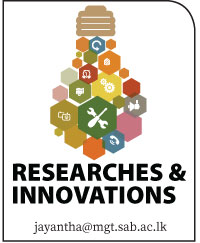 Small and Medium-sized Enterprises (SMEs) are widely recognised as essential in accelerating the economic growth of any developing economy by creating employment opportunities, thus reducing poverty. Despite facing inherent resource limitations, knowledge has become a vital strategic asset for SMEs in modern markets, allowing them to gain a competitive edge, control access to opportunities, and drive innovation and growth.
Small and Medium-sized Enterprises (SMEs) are widely recognised as essential in accelerating the economic growth of any developing economy by creating employment opportunities, thus reducing poverty. Despite facing inherent resource limitations, knowledge has become a vital strategic asset for SMEs in modern markets, allowing them to gain a competitive edge, control access to opportunities, and drive innovation and growth.
As such, theoretically, the knowledge management research stream has recently emerged as a critical contributor to explaining the role of SMEs in uplifting economic growth of developing economies. Coinciding with the development of the knowledge-based economy, the complexity of global change in knowledge management highlights the necessity of conducting collaborative research between different research streams.
Consequently, in recent times, scholars have been keen to conduct research by linking multiple research streams to enhance the understanding of how knowledge accumulated via collaboration with internal and external stakeholders of organisations and how such knowledge spillover allows organisations to achieve competitive positioning.
Building on this premise, recent research highlights that knowledge has become a conduit for fostering entrepreneurial orientation within organisations, particularly in leveraging incoming knowledge spillovers.
As stated in the knowledge management literature, the knowledge spillover perspective of entrepreneurship incorporates the role of entrepreneurial orientation in the knowledge creation and commercialisation process, mentioning the role of the knowledge filter as a catalyst for fostering entrepreneurial orientation.
In addition, adopting emerging digital technologies such as social media, big data analytics, and the Internet of Things has further revolutionised the landscape of knowledge exploration and exploitation within organisations.
These novel digital technologies help SMEs be innovative and proactive in crafting their business strategies by accessing a broad spectrum of knowledge related to internal and external business environments that can be leveraged to create enhanced customer value.
Moreover, SMEs have recognised the importance of customer relationship management as an innovative approach that empowers them to offer customers customised product and service portfolios. Customer relationship management enables SMEs to maximise their value propositions to customers in the long run by capturing and managing customer knowledge, ultimately leading to enhanced competitiveness.
Although most scholars studied the concepts of entrepreneurial orientation, social media, and customer relationship management as separate research streams, there is a high synergistic effect potential in a confluence of these notions.
More explicitly, these three research streams are conceptually interlinked at a broader level, focusing on knowledge management processes within organisations and how they influence the well-established entrepreneurial orientation–business performance relationship.
Nevertheless, the empirical evidence on this topic is fragmented, and there is still an absence of comprehensive studies investigating the interconnections of these concepts from the knowledge management perspective, particularly in the SME context.
Based on the knowledge-based view, we integrate entrepreneurial orientation, social media adoption, and customer relationship management at the organisational process level to address this research gap. We investigate the mechanisms through which knowledge accumulation and spillover through entrepreneurial orientation leverage social media adoption, customer relationship management capabilities, and environmental turbulence to enhance the performance of SMEs in developing economies by answering the following research questions.
1: Does knowledge accumulation and spillover through social media adoption mediate the entrepreneurial orientation –SME performance relationship?
2: Do knowledge accumulation and spillover through customer relationship management capabilities and environmental turbulence moderate the social media adoption–SME performance relationship?
We chose China as the setting for this study because SMEs represent 90% of the country’s businesses and contribute 60% to its GDP. Moreover, in the contemporary business landscape, characterised by the swift adoption of emerging technologies, the SME sector is crucial in driving innovation and positioning China as a global superpower.
Data were drawn from a web-based questionnaire survey targeted at a random sample of 519 SMEs in Beijing, Northern China. The respondents were owners and top-level managers of SMEs, as they possess a comprehensive understanding of their business performance and are responsible for making decisions regarding adopting and implementing emerging technologies.
The findings, derived from partial least squares structural equation modeling, reveal that knowledge spillover through entrepreneurial orientation significantly enhances SME performance.
Additionally, knowledge spillover via social media adoption mediates the relationship between entrepreneurial orientation and SME performance.
Furthermore, environmental turbulence and customer relationship capabilities moderate the link between social media adoption and SME performance.
This study adds to the current body of knowledge management literature by merging entrepreneurship, technology management, and marketing research streams from theoretical and managerial perspectives.
This research is one of the few studies which utilise the knowledge-based view to elucidate connections between entrepreneurial orientation, social media adoption, customer relationship management capabilities, and SME performance. It uniquely links these concepts at the organisational process level, framing them as key knowledge management processes.
Furthermore, this study reveals a significant positive mediating effect of knowledge spillover through social media adoption on the relationship between entrepreneurial orientation and SME performance. It also highlights the substantial moderating roles of customer relationship management capabilities and environmental turbulence in the link between social media adoption and SME performance—insights that have not been explored in prior research.
Sikandar Ali Qalati is an Associate Professor of Management at the School of Business at Liaocheng University in Shandong, China.
Kayhan Tajeddini is a Professor of Strategic Management at the Sheffield Business School, Sheffield Hallam University, UK, and Tokyo International University, Japan.
Thilini Chathurika Gamage is a Professor of Marketing at the Department of Marketing Management, Sabaragamuwa University of Sri Lanka.
This article is an extract of Qalati, S. A., Tajeddini, K., & Gamage, T. C. (2024). How Knowledge Spillover Entrepreneurship Influences the Adoption of Social Media and Customer Relationship Management. Knowledge and Process Management




